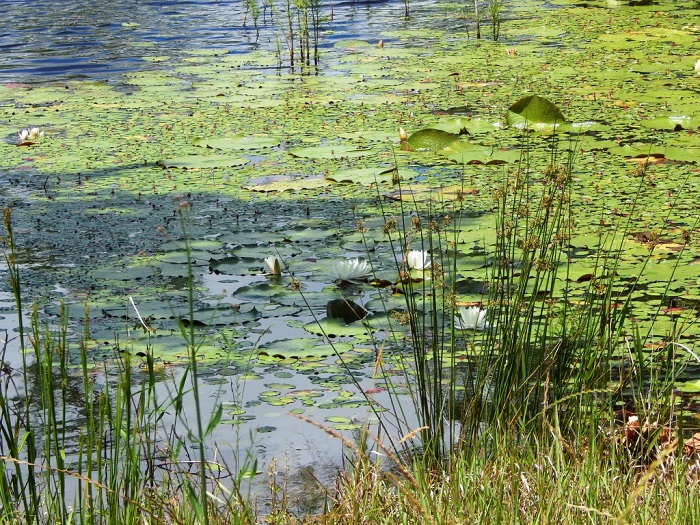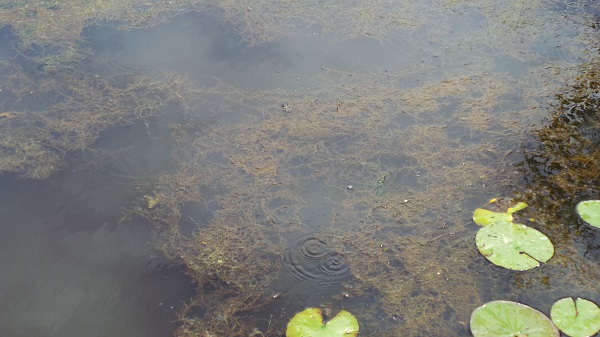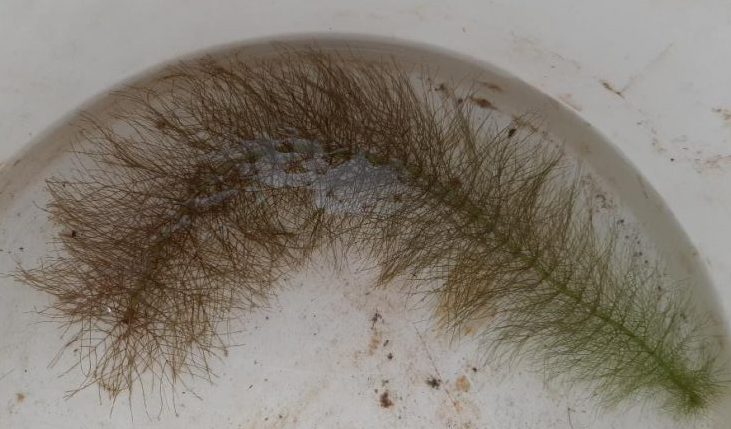
Monitor your ponds closely throughout the spring and make any necessary herbicide applications before weed growth becomes too excessive.
Photo Credit: Mark Mauldin
Even though the calendar says we are only a few weeks into spring, recent weather has been more like summer. The early arrival of sustained warm weather has water temperatures in local ponds high enough that aquatic vegetation growth has really taken off. This early growth period is the ideal time to evaluate ponds and address any aquatic weed issues that may be present, since aquatic weed infestations tend to become worse through the summer. Getting an early start generally helps control efforts to be more successful and less expensive, so get started sooner rather than later.
As plants grow, they are able to build up energy reserves, making them more difficult to control. The longer they are allowed to grow, the stronger and more difficult they are to control. Controlling weeds earlier in the growing season reduces this problem.
Similarly, as the growing season progresses plants produce more and more biomass. If a herbicide is applied and the weeds are killed, large amounts of decomposing plant material in the water can cause problems. The decomposition process uses oxygen; dissolved oxygen in the pond can drop to levels that are hazardous to fish and other aquatic species. The more plant material that is present when herbicides are applied the bigger concern this becomes. Applying herbicides earlier in the growing season, before large amounts of biomass are produced, can help lessen this problem.
Further compounding the issue, warm water is physically able to hold less dissolved oxygen than cooler water. Late in the summer, pond water can be very warm with low concentrations of dissolved oxygen even before large amounts of decomposing plant material are added.

To help reduce the risk of oxygen depletion never treat more than ½ of a pond at one time, if weed growth is already substantial treat no more than 1/3 of a pond at one time and always allow 10 -14 days for oxygen recovery between treatments. Also, avoid treating on cloudy days, another factor that can lead to lowered dissolved oxygen. Photo Credit: Mark Mauldin
Evaluating the vegetation in a pond is always the first step in the management process. Figuring out what kind of weeds you have, and if the population warrants control might seem simple, but it can be somewhat challenging. This is particularly true for submerged weeds – those that grow beneath the surface of the water. Unfortunately, submerged weeds are often the most troublesome weeds for pond owners to deal with. All submerged vegetation is not necessarily a bad thing, but there are several aggressive and/or invasive species of submerged aquatic plants that grow very rapidly and can be quite problematic, making proper evaluation critical.
While emergent and floating plants are easier to evaluate than their submerged counterparts, proper identification of all aquatic plants can help determine their potential for spread and, if warranted, the most effective control measures. If you had problem weeds in your pond last summer, you probably still do; get them identified and under control before they have time to spread. If you did not have problem weeds last summer, be on the lookout for any new/different kinds of weeds to head-off any potential issues.
Due to the current situation with COVID-19, generally speaking, County Extension Agents are not permitted to make field visits, but we are still here to help identify and provide control recommendations for your aquatic weeds. Floating and emergent weeds can generally be effectively identified using pictures. Submerged weeds can be much harder to identify using only pictures. For the best results, special care should be taken when photographing aquatic weeds. Collect a small sample of the weed, place the sample in an opaque container (preferably white in color), cover the sample with clean/clear water just deep enough for the sample to completely spread out and be supported by the water. Take multiple, well focused pictures of the sample. Some pictures should be of the entire sample, while other need to focus on the leaves and the attachment of the leaves to the stem(s). The pictures need to be emailed (not sent via text message) so the image size/quality is not compressed.

A good image of a submerged weed sample. In addition to this image close-ups of the leaves and attachment points will likely be needed for identification. Photo Credit: Nikki West
Now is the time to start managing aquatic weeds. The current situation in the world will make the process a little different, but with some effort and patience your County Extension Agent can help you get your weeds identified and develop a plan for control. On a positive side-note, most of the commonly recommended herbicides used to control aquatic weeds are available to order online, so it is quite possible you can address your aquatic weed issues all while staying “safer at home“.
- Fall is an Excellent Time to Manage Vegetation - October 21, 2025
- Believe It or Not, It’s Time to Start Working on Cool-Season Food Plots - August 4, 2025
- Fall is Here, It’s Time to Spray Cogongrass - October 11, 2024
